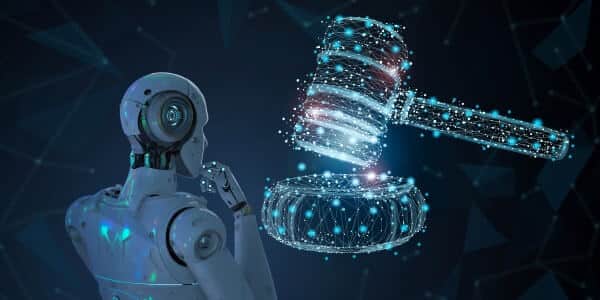
ARTIFICIAL INTELLIGENCE IN LEGAL INDUSTRY
Artificial intelligence (AI) and generative AI are transforming the way we work, learn, and create. Through the automation of tedious tasks and the development of creative solutions, these technology breakthroughs are empowering legal professionals across a wide range of industries and fields to do more with less.
In this sense, artificial intelligence is greatly impacting the legal sector. Even though artificial intelligence is more likely to support rather than replace attorneys in the near future, artificial intelligence and law are currently being used in the Indian legal profession to review contracts, find relevant documents during the discovery process, and undertake legal research. More recently, artificial intelligence in lawhas been used to help form contracts, predict court cases, and even advise judges on bail or sentences.
Artificial intelligence and law: How it is Complementing Each Other?
The artificial intelligence and law are complementing each other in various ways:
Within the domain of Automatic Speech Recognition (ASR)
- Technology has the ability to convert spoken words into written text. It does this by utilizing algorithms for language modelling and natural language processing, which are able to recognize, comprehend, and interpret patterns in human speech.
- ASR technology has continuously developed and advanced over its existence.
- The most obvious use for this state-of-the-art AI tool is the fast and accurate transcription of court cases or client meetings.
- Technology can be a far more cost-effective and efficient transcription tool than traditional human-based transcription services.
In the domain of Automated Marketing Management
- Law firms must use pay-per-click (PPC) advertising and search engine optimization (SEO) to draw in new clients and retain existing ones.
- PPC can yield results immediately by modifying your content or advertisements to appear at the top of the search results webpage, whereas SEO is a long-term strategy that may require months of continual labour to see benefits.
In the domain of Artificial Intelligence Chatbots
- Numerous law firm websites have included legal chatbots on their home page.
- These bots function as virtual assistants, answering frequently asked queries and guiding potential clients through the proper legal processes.
- Although these bots can never completely take the position of a human in a client interaction, they may be able to speed up procedures and boost client engagement by managing routine problems.
- Because chatbots operate around-the-clock, potential clients can still receive timely responses and help even beyond typical business hours.
In the domain of Contract Review and Analysis
- Legal professionals have to invest a great deal of time and energy in the laborious process of contract examination. Artificial Intelligence could potentially speed up this process, saving labour.
- Compared to manual assessments, AI-powered technologies can summarize and analyze contracts given the necessary inputs, helping lawyers identify any issues more quickly.
- This significantly reduces the time required to complete each legal document, freeing up law firms to focus on final evaluations.
artificial intelligence in legal industry: Concerning Issues
The concerning issues within artificial intelligence in legal industry are as follows:
Security and Data Breaches:
- Due to AI security issues, this action carries a danger of data leakage and may infringe an organization’s data retention policy.
- If an organization has ties to the federal government, this significant legal matter may potentially pose a threat to national security.
- Sensitive third-party or internal business data that you enter into ChatGPT becomes a component of the chatbot’s data model as well as can be accessed by others using pertinent queries.
Intellectual Property’s Complexities
- Determining the author of the text or code that ChatGPT produced can be challenging. In accordance with the service agreement, the input provider is responsible for the output.
- However, due to intellectual property concerns, complications may arise if the output incorporates data that is legally protected from inputs that do not comply with AI compliance rules.
- artificial intelligence in legal industry can have copyright issues that may surface if generative AI produces text that is derived from copyrighted property, which would be against AI compliance policies and would put users at legal risk.
Liability and Confidentiality Issues:
- Sharing personal information about partners or customers is illegal and prohibited by contracts.
- Because of ChatGPT’s security, private information is revealed, risks are identified, the company’s reputation is placed at risk, and there may be issues of artificial intelligence in law.
- As an illustration, let’s look at a healthcare institution that uses ChatGPT to respond to patient inquiries. By providing ChatGPT with private patient information, including medical data, you run the risk of breaking legal requirements and violating patient privacy rights.
Tort Liability:
- Associations using AI may be subject to legal risks;
- If the AI produces prejudiced, negligent, or unreliable results that harm people, the association may be responsible for damages.
- As a result, associations need to ensure AI dependability and accuracy by ensuring that the job product is accurate, truthful, comprehensive, and efficient.
When used properly, artificial intelligence in lawcan save labour costs, improve decision-making, and enable instantaneous client responses through chatbots and rapid transcription utilizing automatic speech recognition (ASR) technology. Businesses may be able to focus on challenging tasks, make informed judgments, and speed up administrative procedures by implementing this new technology.
For any latest news, legal topics, judiciary exams notifications, patterns, etc watch Jyoti Judiciary’s YouTube channel for legal videos for any updates at https://youtube.com/@jyotijudiciarycoaching4852?si=2cwubh9d2A9urwJf


